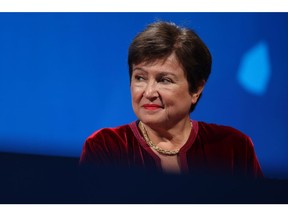KHARTOUM, SUDAN – Sudan hopes to cut fuel subsidies over the course of 18 months, starting as early as March, and replace them with direct cash payments to the poor, the country’s finance minister said, laying out a timetable for sweeping economic reforms sought by international lenders.
The plan comes as Sudan’s fragile democracy is slowly taking shape after the ouster last year of the country’s long-time autocrat Omar al-Bashir.
In an interview with The Associated Press on Tuesday, Finance Minister Ibrahim Elbadawi said the decision was a “no brainer.” The government has previously said it will not change bread and flour subsidies.
Elbadawi’s comments are the first to reveal a planned timeline since the Sudanese government skirted the issue of slashing subsidies late last year, after the country’s pro-democracy movement rejected the move. The government included subsidies in the 2020 budget.
In the interview with the AP, Elbadawi said the plan now is to gradually lift fuel subsidies, which take up 36% of the nation’s budget, as early as March and following an economic conference with civil society groups, and continue into the next year. A former World Bank economist, Elbadawi was appointed to the country’s interim government last year. He said gasoline subsidies would be removed first, before tackling those related to diesel in mid-year.
Sudan’s new leadership is navigating a treacherous transition to civilian rule. Two-thirds of the country’s more than 40 million people live in poverty, and slashing the fuel subsidies could lead to destabilizing protests reminiscent of the large-scale demonstrations that ended al-Bashir’s 30-year rule in April. At the same time, sweeping economic reforms are required to re-integrate Sudan into the international economy and win support from international lenders.
Since al-Bashir’s ouster, an interim government made of civilian and military representatives has been leading the country and the economy — already in a severe downturn and battered by a weakening currency, shortages and inflation — has become the lynchpin of the fragile transitional period.
Sudan has been an international pariah after it was placed on the United States’ list of states that sponsor terror, more than two decades ago. This largely excluded it from the global economy and prevented it from receiving loans from international institutions like the International Monetary Fund.
Sudan’s interim government has also inherited a debt of 60 billion dollars and a rapid inflation rate, and badly needs an injection of funds from foreign donors. The nation’s currency, the Sudanese pound, is trading on the black market for double its official rate of 45.3 pounds to the dollar.
The uprising against al-Bashir began as protests over rising prices of key staples such as bread and frustration among the youth over unemployment and the brutality of the nation’s security forces. Many in the country’s civil society movement fear that lifting subsidies now could make the country’s most vulnerable even poorer.
Elbadawi said a direct cash payment to poor families, through banks or mobile phone transfers, could help ease the shock of the reforms. Such a program could be off the ground in six months, he said, though the government still needs better data to reach all those in need. As part of a pilot group, said that some 4.5 million people would start receiving the money soon, Elbadawi added.
“We think that if we manage to do this, it will be a very viable and credible alternative,” he told the AP. “It will target the poor, it will promote the cause of peace and it will actually change the social contract.”
Because of the longstanding subsidy program, Sudan has been one of the cheapest countries in the world to fill up a tank. Cheap gasoline prices have also encouraged fuel smuggling out of the country. If things were to stay as they were — with no changes to the 2020 budget — the government would be spending more on subsidies than on health, education and internal security combined, Elbadawi said.
To pave the way for international loans, Sudan has been in talks with the U.S. to remove it from the list of terrorism sponsors —something Elbadawi hopes will be only a matter of weeks or a few months. In the meantime, he said the government is in talks with the IMF and is working on a reform program that could lay the groundwork for future debt relief.
The government is also launching a national dialogue to explain the necessity of the subsidy reforms but will tread carefully, aware of likely popular opposition, Elbadawi said. The Sudanese Professionals Association, the main organizer of demonstrations during last year’s uprising, has threatened to mobilize protesters if the transition goes astray.
That means Sudan’s civilian stakeholders would have to be on board with the program.
“If, for whatever reason, we are unable to reach a consensus, then I think it will be incumbent upon the government to explain the consequences and to allow the Sudanese people to take whatever decision and course they want to take,” Elbadawi said.
Source link
Related





















Comments